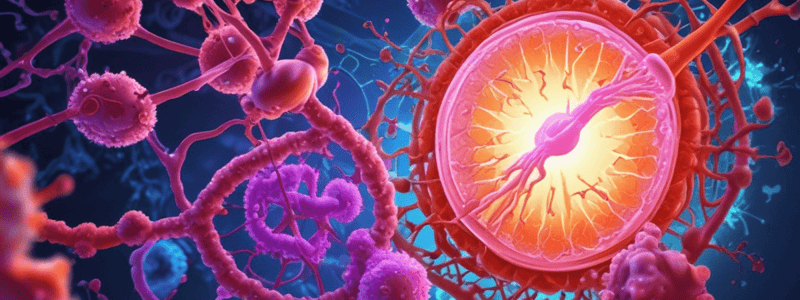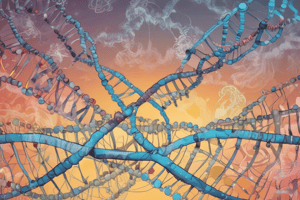Podcast
Questions and Answers
DNA changes that lead to cancer are always inherited from parents.
DNA changes that lead to cancer are always inherited from parents.
False (B)
Overactivation of proto-oncogenes and deactivation of tumor suppressor genes can both lead to uncontrolled cell growth and the development of a tumor.
Overactivation of proto-oncogenes and deactivation of tumor suppressor genes can both lead to uncontrolled cell growth and the development of a tumor.
True (A)
Mutations in the BRCA1 and BRCA2 genes are always inherited and cannot be acquired through environmental factors.
Mutations in the BRCA1 and BRCA2 genes are always inherited and cannot be acquired through environmental factors.
False (B)
The Ras protein is a transcription factor that regulates cell proliferation.
The Ras protein is a transcription factor that regulates cell proliferation.
To analyze possible cancer-causing mutations, you should always sample the tumor tissue itself.
To analyze possible cancer-causing mutations, you should always sample the tumor tissue itself.
Mutations within coding regions of a gene are more likely to impact the final protein product compared to mutations within introns.
Mutations within coding regions of a gene are more likely to impact the final protein product compared to mutations within introns.
Mutations in tumor suppressor genes or proto-oncogenes always result in uncontrolled cell proliferation and cancer.
Mutations in tumor suppressor genes or proto-oncogenes always result in uncontrolled cell proliferation and cancer.
Cell cycle checkpoints play no role in the development of cancer.
Cell cycle checkpoints play no role in the development of cancer.
Germ line mutations are only passed on to future generations, while somatic mutations have no impact on the individual.
Germ line mutations are only passed on to future generations, while somatic mutations have no impact on the individual.
DNA mutations that alter the amino acid sequence of a protein are more likely to impact its structure and function compared to mutations that do not change the amino acid sequence.
DNA mutations that alter the amino acid sequence of a protein are more likely to impact its structure and function compared to mutations that do not change the amino acid sequence.
Chromosomal rearrangements are considered large scale alterations in the genome.
Chromosomal rearrangements are considered large scale alterations in the genome.
Substitutions in protein coding regions can have a minimal or major effect on the resulting protein.
Substitutions in protein coding regions can have a minimal or major effect on the resulting protein.
Frameshift mutations are more likely to cause a catastrophic effect if the mutation occurs at the 3' end of the mRNA.
Frameshift mutations are more likely to cause a catastrophic effect if the mutation occurs at the 3' end of the mRNA.
Nonsense mutations always result in a truncated protein.
Nonsense mutations always result in a truncated protein.
Insertions and deletions of 3 nucleotides in the coding sequence can maintain the reading frame.
Insertions and deletions of 3 nucleotides in the coding sequence can maintain the reading frame.
Mutations in genes that normally regulate cell proliferation can lead to uncontrolled cell growth and cancer.
Mutations in genes that normally regulate cell proliferation can lead to uncontrolled cell growth and cancer.
DNA mutations that cause cancer are always inherited from parents.
DNA mutations that cause cancer are always inherited from parents.
The Maturation Promoting Factor (MPF) is a complex of cyclin and cyclin-dependent kinase (Cdk) that is essential for the G2 checkpoint.
The Maturation Promoting Factor (MPF) is a complex of cyclin and cyclin-dependent kinase (Cdk) that is essential for the G2 checkpoint.
Mutations in the $p53$ gene are an example of a genetic predisposition to cancer that can be inherited.
Mutations in the $p53$ gene are an example of a genetic predisposition to cancer that can be inherited.
The G2 checkpoint ensures that DNA replication is complete before the cell enters mitosis.
The G2 checkpoint ensures that DNA replication is complete before the cell enters mitosis.
A point mutation that changes the UUU codon to UUG results in a missense substitution.
A point mutation that changes the UUU codon to UUG results in a missense substitution.
Huntington's Disease is caused by a frameshift mutation.
Huntington's Disease is caused by a frameshift mutation.
In sickle cell anemia, a missense mutation in the $\beta$-globin gene leads to abnormal hemoglobin structure and function.
In sickle cell anemia, a missense mutation in the $\beta$-globin gene leads to abnormal hemoglobin structure and function.
Cell cycle checkpoints ensure that the cell has undamaged DNA and appropriate signals before proceeding to the next phase.
Cell cycle checkpoints ensure that the cell has undamaged DNA and appropriate signals before proceeding to the next phase.
Mutations in genes involved in cell cycle regulation can lead to uncontrolled cell proliferation and cancer.
Mutations in genes involved in cell cycle regulation can lead to uncontrolled cell proliferation and cancer.
Flashcards are hidden until you start studying




